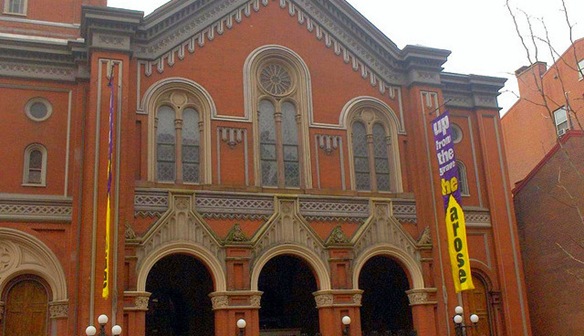The late Mariano DiGangi, pastor (of Tenth Presbyterian Church among others), scholar, and missionary to his Italian homeland, is remembered in many ways. I tend to think of him as a pioneer in the study of Peter Martyr Vermigli about whom Mario wrote a valuable book in 1993 (based on his Bachelor of Divinity thesis 1949 titled “Pietro Martire Vermigli: An Italian Calvinist”). Last week, however, after meeting Mario’s longtime friend, Don MacLeod, who eulogized the old Italian pastor, I realized that I only have the tip of the iceberg.
It was over lunch that I had the pleasure of asking Don questions about Mario’s legacy. It wasn’t long before tears began to run down Don’s cheeks while he explained the many ways that Mario inspired him and a generation of others to serve Christ through preaching and teaching. Among the various nuggets that I acquired, I was most impressed by the genuine affection that Don continues to have for his mentor. With Don’s permission, I have pasted the actual eulogy below. I hope it blesses you as it did me.
“My father, my father, the chariots of Israel and the horsemen thereof.” Elisha’s exclamation as Elijah was carried to heaven in a chariot came to mind as the word went out of Mariano DiGangi’s homecall on the 18th of March, the Tuesday of Holy Week. For many of us Mario was indeed our spiritual father. His articulate intellect, his fundamental integrity, his essential godliness, continually reminded us of the influence and power of a single life. What he said of the death of his hero Peter Martyr Vermigli was also profoundly true of himself: “Right to the end, this old soldier showed faith and firmness as a member of the Church militant en route to joining the Church triumphant.”[1]
All of us here today who loved him have our favourite Mariano DiGangi anecdotes. I have been reviewing almost a half century of correspondence, poring over some of his voluminous writings, reminiscing about his life. Mario could say a great deal, eloquently, in few words. May I also have the gift of brevity as I try in a few moments to encapsulate his towering legacy and example.
Mario was Italian, Sicilian, the son of immigrants. From his art work you could tell his love for his native soil. The warm colours, the reds, the ochre, the bright greens, you knew that here was a man who was passionate about his heritage. And at the end, when the man (now ninety-two and still active in ministry) who brought him to faith and encouraged him to enter the ministry when he was a teenager in Brooklyn, spoke to him as he lay dying it was in Italian, the language of his heart. Mario had a deep love, shared with Ninette, for everything Italian. Remember his recounting, on his return from Italy, his latest ministry opportunities, his encouragement of Italian students preparing for ministry, his love of Sicily, of pasta, of Chianti. That vision was shared and enabled by orange juice magnate Antonio Rossi in a providential partnership.
Mariano’s attachment to Italy was all the more surprising because, except for seven years in the Italian Presbyterian Church in Montreal, his entire ministry was spent among Scots and Anglo-Saxons. There were times when he joked about needing to be renamed “MacGangi” – particularly during that decade when he was in Hamilton at St Enoch Church among Scottish immigrants. His name was also described by some as a liability because it did not end in “B” as with every other noted minister at Tenth Presbyterian Church.
Those six years in Philadelphia were arguably the pinnacle of Mario’s ministry and yet also, as is so often the case, the most personally costly. Ten years after he left, the now noted American historian Allen Guelzo gave full honour to what he accomplished there. “DiGangi,” he wrote, “was obstinate in his public position on civil rights and urban mission, but he was not obnoxious, and after the temperamentally touchy had gathered their skirts around themselves and departed, the church quietly contented itself with Di Gangi’s moderation. Most important, Di Gangi continued to educate and edify his flock with consistent biblical preaching.”[2]
Having taken a principled stand on the Confession of 1967 as inconsistent with commitment to Reformed and confessional orthodoxy, Mario returned to Canada. Here of course, he was welcomed enthusiastically. In the Presbyterian Church in Canada his name resonated: he had trebled the membership of a gritty east end Hamilton congregation to over a thousand, he had commuted a day a week into Toronto to serve as unpaid secretary of the embryonic denominational Board of Evangelism and Social Action, and his synod-sponsored radio programme “Time and Eternity” was broadcast throughout the Atlantic provinces and Alberta.
Becoming general director of the Bible and Medical and Missionary Fellowship (which he later named InterServe) in 1967 now placed Mario in an international context. He joined the missionary ranks of this congregation. Always committed to the Great Commission, he now had a platform to challenge and goad his audiences to sacrificial engagement with the demands and opportunities of the worldwide church. For the next twenty-five years his schedule made superhuman demands on him physically and spiritually. No invitation, it appeared, was ever turned down and he was in constant demand. His ability to cross time zones, emerge from intercontinental air flights, and every imaginable kind of speaker’s accommodation, was an act of heroic proportions. None of us knew how he did it, and without his strong faith in a sovereign Lord – and the constant support of Ninette – he could not have accomplished half of what he did in those tumultuous years of feverish activity.
While in Bombay India in 1969 he received a call from the executive of an embryonic and troubled Evangelical Fellowship of Canada asking him to become president, a task that he filled with distinction for two years in a rescue operation. Further opportunities came: at Lausanne 1974 the Canadian contingent asked him to become chair of the Canadian committee.
And in 1975/6, with the startup of Tyndale Theological Seminary as a graduate school of what was the Toronto (later Ontario) Bible College, Mario signed on as Professor of Pastoral Studies. For a decade he inspired a whole generation of preachers. Many of his students had their pulpit ministries shaped by his example and inspiration. He was always organized, always practical, and always demanding the best of those who sat under him. He set the bar high, and many who had him as instructor still feel his presence as they mount the pulpit steps.
In the autumn of 1987 he became regular pulpit supply at Knox Church. Two years this congregation, unable to agree on a candidate and profoundly grateful for his leadership, asked him to come out of retirement and at an age when many would feel they could coast to the finish line he was called. In less than three years health concerns made him resign.
What was there about this man that God used him so mightily? There was an essential humility, a self-effacing even self-deprecating inability to take himself seriously. Given other pulpit personalities, and his gifts of oratory, and his adoring congregants, that was no small gift. I think that one thing that saved him was his marvellous sense of humour, his puns. When I turned sixty, always a sombre moment, he lightened the occasion by giving me a book of humor inscribed “to a senior (as well as señor).” He was a delight to work for, my wife who also served at InterServe along with many others, some of whom are here today, will vouch for. Organized, thorough, fair, compassionate, and even-tempered.
When all is said, however, the answer to my question as to why God used him would be found in a single word; “Grace.” I conclude with a quote from a sermon he preached on Isaiah 6 over forty years ago: “The livelier our sense of guilt and grace and gratitude, the more faithful and fervent will be our obedience to our Lord and Saviour. When we are grateful for the grace that is greater than all our guilt, our souls are stirred to deeper reverence and higher loyalty.” [3]
“My father, my father, the chariots of Israel and the horsemen thereof.”
A. Donald MacLeod,
Research Professor of Church History,
Tryndale Theological Seminary, Toronto
[1] DiGangi, Mariano; Peter Martyr Vermigli 1499 – 1562: Renaissance Man, Reformation Master; Lanham, MD: University Press of America, 1993; 181.
[2] Guelzo, Allen C “City Church Again” chapter 4 in Tenth Presbyterian Church of Philadelphia; Phillipsburg, NJ: Presbyterian and Reformed Publishing, 2004, 107
[3] DiGangi, Mariano; “The Day I Met God”; Philadelphia: “Time and Eternity”, 1965.





